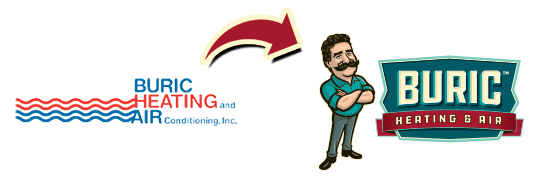
There’s nothing like being inside your warm home on the coldest winter days. Unfortunately, while you may enjoy the warmth of your furnace and your favorite hot beverage, you may notice some not-so-enjoyable symptoms.
Do you experience any of the following during the winter months?
- Throat and eye irritation
- Dry skin and rashes
- Coughs and colds
- Snoring and sleep apnea
- Increased asthma and allergy symptoms
- Nosebleeds
- Congestion
- Trouble sleeping
If yes, you aren’t alone. Many people believe these are caused by cold weather. In truth, these are often the result of poor winter air quality. For some people, these symptoms can become bad enough to seriously impact their quality of life.
Why Is Air Quality Bad in Winter?
It’s difficult to keep indoor air quality at good levels in the winter for a few reasons. First, you’re much less likely to open windows or doors to let in the fresh air. You may even winterize your home by sealing off leaky windows or drafty doors. This means less air circulating in and out of your home. Instead, you breathe recirculated air.
On the one hand, that recirculated air stays warmer, and that makes it easy to keep your home at a comfortable temperature. On the other hand, recycled air carries loads of dust particles and germs. Worse, as that air cycles through your furnace, the concentration of nasty elements increases.
Fortunately, you don’t have to accept indoor air pollution just because it’s cold outside. There are steps you can take to improve your indoor air quality this winter.
7 Steps to Fix Poor Indoor Air Quality
If you want to improve the indoor air quality in your office or home, start by checking out these seven tips.
1. Select Non-Toxic Cleaning Products
It’s very important to choose the right products for winter cleaning. If you already notice that your chosen cleaning sprays and wipes irritate your nose and throat, imagine how that will feel in the winter with no ventilation. Those fumes will just recirculate through your home repeatedly.
Consider finding a gentle, non-toxic line of cleaners for daily use. Then, reserve the stronger cleaning products for the messes that need them.
2. Have Your Furnace Serviced Annually
This is probably the most impactful of all indoor air quality tips. When you have a professional HVAC technician service your heating system, you may see significant improvements in your indoor air quality. One of the first things your technician will do is inspect and help you replace your air filter if needed. This is a good time to request a recommendation for a better quality filter that will trap microbes that lesser filters allow to pass through.
Additionally, your service tech will thoroughly clean your unit of dust and debris. It will work more efficiently because of this. That’s also less dust entering your heating system and traveling through your vents. Finally, they will identify and fix leaks and other issues. Depending on the problems they uncover, this could prevent toxic fumes from being released into your home or office.
3. Add Some Houseplants
Are you here to learn how to improve indoor air quality naturally? This tip is for you! Add a few houseplants to your home, and you will enjoy better air quality.
Plants help to purify the air inside your home by removing toxins like benzenes and formaldehyde from the air. These are volatile organic compounds that can come from ordinary household products like air fresheners and cosmetics. They may also be released by your furniture, paint, and flooring.
4. Consider a Humidifier
Winter air means dry air. When you are running your furnace in a closed home or office, the air gets drier over time. That’s what causes the dry skin, brittle air, congestion, and other symptoms you experience during the winter months. You may have even noticed that you or other members of your family experience nosebleeds. If your home has dry air along with winter dustiness, that can make things absolutely miserable.
It isn’t just people who are impacted by dry air. This problem can also impact the objects in your home as well. Your hardwood floors, wooden furniture, and doors can warp or crack when humidity levels are too low. Be especially careful if you have musical instruments as the delicate wood parts can be damaged.
If the air in your house is dry and uncomfortable, consider adding a humidifier. These add moisture back into the air and help you breathe easier. Additionally, humidifiers help your furnace to run more efficiently. When you add moisture to the air in a warm environment, you feel warmer. That’s why tropical areas tend to feel hotter than more arid regions.
5. Open Windows When You Can
If you are fortunate enough to experience some milder weather in the winter, take advantage of that. Opening some doors and windows for just a couple of hours can make an amazing difference. This will allow fresh air to circulate in and stale air to circulate out. It won’t take long for the air inside your home to feel and smell better.
6. Stay on Top of Cleaning
You can improve your indoor air quality standards in your home by taking your cleaning to the next level. When you get rid of dust and pet hair in your carpet and furniture, you prevent that from going into the air. For example, take your curtains and area rugs outside to shake them out to remove dust and grime. Winter is also a great time of year to pamper your pets with a trip to the groomer. Ask them about a wash and shed treatment to reduce hair and dander.
While you’re at it, take a closer look at your vacuum cleaner. Does it have a HEPA filter? If not, consider upgrading to one that does. These filters trap particles and allergens instead of blowing them back into the air. Are you planning some home improvements this winter? If you plan on replacing any flooring, remember that hard surfaces are better for air quality than carpets.
7. Have an Air Purifier Installed
If you’re skeptical about the effectiveness of those air purifiers that you find on the shelves of your local big-box store, you should be. These aren’t very effective. However, there are air purifiers that do a great job of improving the air in your home, especially during the winter. Even better, they can clean the air in your entire home.
Ask your HVAC provider about a UV air sanitizer. These units use ultraviolet light to remove toxins from the air. Once they are installed, these products help clean the air in your home and remove unpleasant odors. UV light has been shown to work on even the smallest particles, including dust mites and pet dander.
Poor Winter Air Quality Isn’t a Given
You may have believed that dry, dusty air is something you just have to deal with. Nothing could be further from the truth. If you are willing to create a few new habits, invest in some quality products, and get professional help, you can easily tackle this problem.
If you are interested in an air purifier, annual HVAC service, or simply have questions about indoor air quality, give us a call! We’re always happy to answer your questions or schedule a service call at your convenience. You and your family deserve air that is safe and clean.




